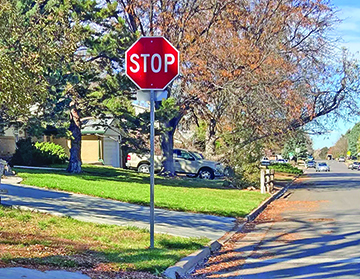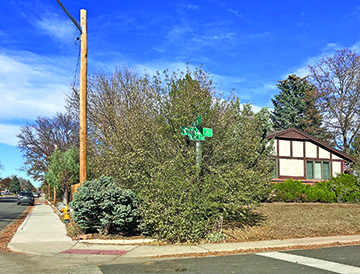by Heather Brecl
In case 2023 didn’t have enough in store for everyone, 2024 is on the path to deliver more. In November 2022 Denver voters narrowly passed a new citizen-led ballot initiative called Ordinance 307 resulting in an annual fee for sidewalk construction that is coming due in the new year. Homeowners in the city of Denver will have to get ready to add one more bill to the list of things to deal with as a homeowner. On top of the tripled property tax and now the bill for trash removal, residents of Denver will be assessed a new fee that was designed to fund a complete overhaul of the sidewalk system throughout the city. This initiative was spearheaded by the nonprofit organization called Denver Streets Partnership.

Whether or not homeowners actually have a sidewalk, they will be paying a fee to the City for the project for at least the next 10 years.
How much is the fee and how can residents figure out what it will be? The city of Denver created a tool that provided an estimate for homeowners. On average the fee will be around $108/year per household, however if a home is positioned on a street corner, the fee will in some cases be as high as $450 per year. Since the fee is assessed according to the linear footage that a property has along a city street, the longer the property boundary, the higher the fee will be. Unfortunately for residents trying to forecast expenses for the upcoming year, the pricing tool has been taken down from the Denver County website and the following notice is in place: “The city’s sidewalk task force is reviewing the sidewalk ordinance and may refine the current fee structure to ensure it is applied in a way that is as fair and reasonable as possible. DOTI (Department of Transportation and Infrastructure) has removed the sidewalk fee lookup tool it previously offered on this webpage while that assessment is underway.” The task force is scheduled to complete their evaluation by
July and levy the fees.
Denver resident Erin F. (last name withheld at her request) is outraged by the new sidewalk fee which for her will be over $450 per year since her home has what is now seen by her as the misfortune of being on a corner lot. Prior to the sidewalk tax, Erin appreciated her large lot that she and her son have enjoyed for years. She also takes on the responsibility of making sure that the sidewalk is always shoveled, even shoveling her elderly neighbor’s sidewalk during snowstorms. Even though Denver residents do not own actually own the sidewalk, it has been their responsibility to make sure it is cleared of snow in the required amount of time and that repairs done as needed.
With the new fee structure, the responsibility for sidewalk repairs and improvements shifts to the City of Denver. While this seems to lessen the burden of homeowners having to do expensive repairs themselves, many homeowners will in effect just be paying a sometimes exorbitant fee for sidewalks that may not ever need any repairs in their lifetime. It also leaves to question what the actual process will be to have any needed repairs done with no reasonable sense for a timeline as the process will be new from start to finish and will encompass the entire sidewalk network.
To Erin F. and many other homeowners, the new sidewalk fee seems anything but fair. “The new fee is a huge burden to people, on top of everything else that we have on our plates with a big increase in property taxes and now having to pay for trash too,” said Erin F. “People are going to lose their homes over this. I have no control over who uses my sidewalk but now suddenly I’m responsible for paying more than any of my neighbors to maintain it even though it was recently repaired and is in perfect condition. I don’t understand how anything about this fee is fair and equitable as the Denver Streets Partnership claims it is.”
Erin wants to know how the city plans on dealing with situations in which the homeowner is unable to afford the fee and if there will be any relief. She said that she has issued multiple complaints with the Partnership but has not gotten specific answers to her questions, and that the current policy only offers relief to certain neighborhoods.
Executive Director Jill Locantore of the organization that spearheaded the sidewalk effort responded to questions and concerns about the inequities of the assessed fee stating that “fair is a matter of opinion and perspective.” She explained that Denver has had an ongoing conversation for the past 20 years since the Webb administration about improving the sidewalk situation and the residents of Denver have spoken by voting for the ordinance. Locantore emphasized that the majority of Denver’s citizens voted to have safe sidewalks and it is her organization’s commitment to fulfill that mission, making sure that people have a safe way to walk through their neighborhoods and move about their communities. The City’s stakeholder committee is currently reviewing ways to tighten up the differences between the average fees assessed and the “outliers” such as those who own properties on long sidewalks and corners. She stated that they cannot make everyone happy but are making concerted efforts to make as many people happy as possible.
Overall, the Partnership, in conjunction with the City of Denver, estimates that a complete overhaul of the sidewalk system will cost upwards of $1 billion and will take up to 10 years to complete. Annually the fees will total approximately $40 million which is how much DOTI believes to be the cost of yearly maintenance. The additional funds will be raised from bonds.
Erin F. remarked that she will most likely never see any immediate benefit to the thousands of dollars in sidewalk fees that she will pay over the coming years as her sidewalk was just recently redone. On average, homeowners sell their homes after seven years which means that most will be in the same situation as Erin and will contribute to the sidewalk fund without ever directly reaping the benefits.
Homeowners may think that they will avoid being assessed the fee if there is no sidewalk but they are mistaken. The fee applies to all properties bordering a city street — whether or not a sidewalk actually exists. As is stated on the denvergov.org website, “(T)he requirement to pay the sidewalk fee is not dependent upon having a sidewalk or whether or not a property owner has recently completed installation or repairs. The fee is a revenue source to fund maintenance and repair projects and new sidewalk installations to connect people to places and services citywide.”
Furthermore, homeowners who think they refuse to pay the fee or cannot pay, will have a lien placed on their properties and the city will not be issuing any refunds or exemptions. Locantore did point out that certain discounts will be offered in the amount of 20% for real estate property located in neighborhoods which have been historically underfunded and are considered area of risk under the city’s NEST (Neighborhood Equity and Stabilization) program.
As a single mom who struggles to make ends meet, Erin F. hopes that the efforts of the City’s stakeholder committee gives earnest consideration to the concerns she has and others in the same boat.
For more information on the impending sidewalk fees, go to denversidewalks.com and devergov.org and look for Sidewalk Construction, Reconstruction and Repair.

